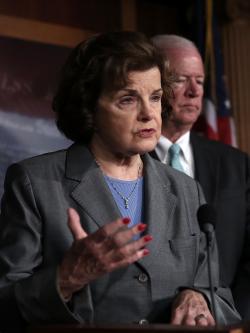The disclosure of a sweeping secret court order demanding Verizon turn over Americans’ phone records has come as a shock to some. But the revelation is no big deal, according to the chair of the Senate Intelligence Committee—because it’s been happening for years.
The Guardian revealed Wednesday that a business subsidiary of Verizon had been ordered to hand over data to the National Security Agency showing all calls made and the duration of each call over a three-month period ending July 19. Rights groups, including the American Civil Liberties Union, reacted to the news with outrage and called for an immediate end to the surveillance. But Intelligence Committee Chairwoman Sen. Dianne Feinstein, D-Calif., attempted to play down the controversy over the snooping in a statement to reporters Thursday, describing it as merely a “three-month renewal of what has been the case for the past seven years.” The sweeping order has been in place since 2006, according to Feinstein, who is fully briefed on secret surveillance in her role on the Senate committee. “This is called protecting America,” Feinstein added.
Feinstein’s statement is in line with what former employees for the NSA said in interviews on Thursday. Thomas Drake, a former senior NSA official who was prosecuted after alleging rampant waste, fraud, and abuse at the agency, said in an interview with Democracy Now that the mass grabbing of Verizon phone records was unsurprising:
This is routine, these are routine orders, this is nothing new. What’s new is we’re actually seeing an actual order and people are somehow surprised by it. The fact remains that this program has been in place for quite some time. It was actually started shortly after 9/11. The Patriot Act was the enabling mechanism that allowed the United States government in secret to acquire subscriber records from any company that exists in the United States.
William Binney, another former NSA employee, said during the same Democracy Now segment that he too thought the Verizon phone-records grab was part of a wider trend of sweeping NSA surveillance. Binney worked for the NSA for 32 years before resigning in 2001 over the issue of domestic surveillance and has since made a series of allegations about the agency’s spying capabilities. “If Verizon got one, so did everybody else,” Binney told Democracy Now, adding that he estimates roughly 280 million U.S. citizens are each in the NSA databases “several hundred to several thousand times.”
In a separate development Thursday, Attorney General Eric Holder appeared before the Senate Appropriations Subcommittee and was quizzed about the Verizon order. Holder looked uncomfortable answering questions about the scale of the surveillance and whether it had swept up the call records of some branches of government. The attorney general said he couldn’t answer specifics but agreed to attend a classified hearing to brief lawmakers. “I’d be more than glad to discuss this in an appropriate setting,” he said.
